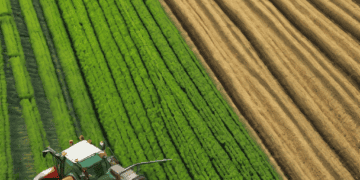Global agricultural trade has surged over the past few decades, exceeding $1.5 trillion in 2018, more than double the figures from 1995. This robust growth, as highlighted in The State of Agricultural Commodity Markets, 2020 (SOCO 2020) by the Food and Agriculture Organization of the United Nations (FAO), underscores the pivotal role of trade and markets in driving inclusive economic growth, sustainable development, and resilience against various disruptions.
Director-General QU Dongyu emphasized the significance of leveraging markets within the global food system, particularly in times of crises such as the COVID-19 pandemic, climate change, or pest outbreaks like locust invasions.
A notable transformation in agricultural markets is the rise of global value chains, which facilitate cross-border trade, linking farmers, traders, and consumers worldwide. This shift, attributed to income growth, reduced trade barriers, and technological advancements, has enabled emerging and developing countries to significantly enhance their presence in global trade, accounting for over a third of the world’s total.
However, while global value chains offer opportunities for smallholder farmers to boost production and income, challenges persist in ensuring their equitable participation. Stringent quality and safety requirements within these chains could potentially marginalize smaller agricultural producers.
The FAO report underscores the necessity of inclusive policies to integrate smallholder farmers into modern food value chains, advocating for improved rural infrastructure, education, and access to productive technologies.
Digital innovations present an avenue for enhancing market functionality and accessibility for farmers. Technologies like e-commerce platforms hold potential benefits for both producers and consumers. Nevertheless, bridging the digital divide in agriculture is imperative to ensure the underprivileged share the advantages of these advancements.
The report highlights inclusive business models like contract farming and blockchains as effective means for farmers to integrate into sophisticated value chains. Contract farming, for instance, has the potential to substantially increase farm income, but more comprehensive information regarding its overall impact is required.
Emphasizing the role of agri-food markets in sustainable development, the report advocates for wider adoption of voluntary sustainability certification schemes. These schemes address the trade-offs between economic, environmental, and social goals, promoting fair trade, environmental stewardship, and improved livelihoods for farmers.
Notably, while trade in certain commodities adheres to sustainability standards, such as coffee in Uganda and shade-grown coffee in Ethiopia, there remains a significant gap in covering commodities like bananas, where only a small fraction meets sustainability criteria.
The report also delves into the evolving trends driving international agri-food trade, highlighting factors like technological advancements, population growth, urbanization, and changes in trade policies. It acknowledges the importance of regional trade agreements in bolstering global value chain participation and policy reforms.
In essence, The State of Agricultural Commodity Markets, 2020 sheds light on the intricate interplay between trade, markets, sustainability, and the evolving dynamics within the agricultural sector.
Get the latest supply chain report news insights at The Supply Chain Report. For international trade resources, visit ADAMftd.com.
#GlobalAgriculturalTrade #FAOReport2020 #AgriculturalValueChains #FoodSystemInnovation #SustainableDevelopment #SmallholderFarmers #TradeGrowth #AgriFoodMarkets #EcommerceInAgri #DigitalDivide #ContractFarming #BlockchainInAgriculture #SustainabilityInAgriculture #FairTrade #AgriTech #EmergingMarkets #AgriculturalPolicies #InclusiveAgriBusiness #FarmIncomeGrowth #RegionalTradeAgreements #UrbanizationAndAgriculture















